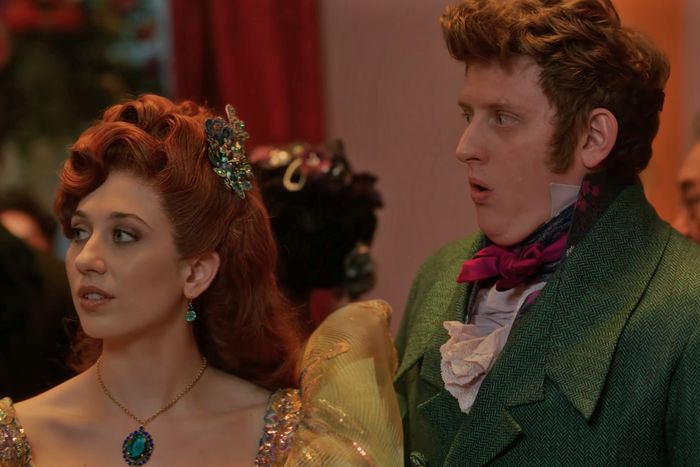
There’s a widespread and sadly tragic misunderstanding of Bridgerton as a show primarily about romance, and this sensible but wrongheaded conclusion has some basis in fact. Kissing, love scenes, plots that center on sexual desire and a marriage arc, the fact that the show is based on an immensely popular series of romance novels … all of this is romance fodder, and it’s no one’s fault that a misapprehension has taken hold. By the end of season three, though, Bridgerton has become something else entirely: a show where Philippa Featherington Finch, a minor figure with fairly little character development and a penchant for dressing in acidic tones, yells the words, “Now, Varley! The bugs!”
The context is useful here. At the culmination of the season, central character Penelope Featherington, here only important as one of Philippa’s sisters, has just completed a long and triumphant monologue. She’s the person behind Lady Whistledown, the author of a series of gossip columns about high society, and she’s standing up for the people society ignores, she’s proud and unabashed, etc., etc. From another, more important perspective, she has taken center stage at a party that’s supposed to be for Philippa and her sister Prudence. They’re both pregnant for the first time, and all they want is a nice ball in beautiful shades of purple and orange to send them off into dusty boring matronhood. But here comes Penelope, once again making everything about her, and when she’s finally done, Philippa has to reset the mood so the partygoers can go back to enjoying themselves. Thankfully, she is poised and prepared and, most especially, enthusiastic about this opportunity.
“Now, Varley! The bugs!” Harriet Cains’s Philippa cries, scooting herself across the ballroom. Varley, the Featheringtons’ housekeeper, has also hustled herself into the appropriate position. She pulls down on a rope to release the covering of a cageful of butterflies, which fly around the ballroom, eliciting gasps and applause.
Philippa’s never been the most insightful or intellectual presence, but sometimes a thought will wander through the beautiful open landscape of her mind and stick there. In a scene shot for season three, Cains says, Philippa happens to pick up a book about insects, and so they become the thing she cares about most this season. It’s what she wants as her ball’s big theme, and her clothing (and eventually her daughter’s as well) reflects her newfound passion. “She’s vain, and she’s into the aesthetics,” says Cains. “She never thinks before she speaks. She vocalizes every thought and always says exactly what she means.” These factors create the necessary conditions that eventually result in “Now, Varley! The bugs!,” a moment so monumental that it’s the one thing Cains chose to tease before the season premiered. This delivery did not derive from multiple line readings or an overconsidered approach to a crucial moment of levity. “There is only one way to deliver that,” Cains says, “and that is with urgency. Just, let’s urgently get these bugs out.”
Without question, there’s urgency at the heart of the line given the intensity of Philippa’s “now.” The concision of her speech — no full sentences, no verbs whatsoever — underscores the importance of speed. But the beauty in the line, the soul of it, is in the phrase “the bugs.” With only a slight variance in intonation or fervor, it’s a line from a horror film. The choice of “bugs” rather than “butterflies” swerves silly but also aims toward an essential truthfulness about the nature of all creatures, a way to discard the softer, more broadly appealing image of the lovely and ornamental butterfly in favor of something weirder, more blunt and unnerving. The result, a cloud of (CGI) butterflies swirling throughout the event space, is pure fantasy and delight, but the line itself, with its rushing finality on the word “bugs,” is a lone note of dissonance in an otherwise simplistic major chord. It is the element of asymmetry that creates rhythm in a design. It is the extinguished candle set off to the side of an otherwise lush still life, the memento mori, the small reminder that outside this world of drama and impossible wigs and true love, there are also bugs.
Many shows have romance plots (not enough, but many). There’s kissing. There are weddings. There are plenty of period pieces on TV, too, with a surfeit of fun costumes and grand settings and now-foreign social rules. What sets Bridgerton apart, what really makes it special, is not any of those things. It’s the fact that the middle of the finale, at the moment of its greatest emotional heights and its soaring, triumphant but also fairly basic thesis statement about gossip and ambition and feminism, Philippa Featherington Finch can announce, in somewhat quavering but delighted tones, “Now, Varley! The bugs!”
More ‘Bridgerton’
- Pride 2024’s Most Femininomenal Moments
- Justice for Cressida
- The View Is Pro–Sex Scene in the Case of Bridgerton





